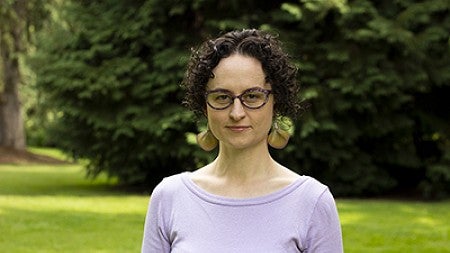
Psychology
fausey@uoregon.edu | 541-346-4951
Courses: PSY 301, PSY 303, PSY 475, PSY 440, PSY 607
In my classes you will:
- Practice foundational, transferrable skills.
- Explore new perspectives.
I was invited into the Teaching Academy because:
- I am an Ersted Award Recipient.
In what ways are you working to make your teaching inclusive?
If you are a student in my course, I want to know your name, I want to hear your questions, and I want to learn your goals for your next steps. I facilitate discussions so that everyone enjoys agency and I expect questions and discussions beyond the classroom.
What do you do in terms of professional engagement with the teaching and learning culture on campus or nationally?
I am a cognitive psychologist and developmental psychologist by training, with particular expertise in how experiences matter for building knowledge over time. I therefore keep up with primary research about learning and memory, including the latest discoveries about best practices in undergraduate classroom pedagogy.
In what ways was your teaching in this course research-led—informed by research on how students learn and inflected by UO's research mission?
In lecture courses, I include regular opportunities for retrieval practice. For example, I start every lecture with "Tell me two things you remember from our previous class.” I also design the timing of quizzes and exams with memory and generalization principles like optimal spacing in mind. In discussion-based seminars, I routinely ask open-ended questions to facilitate broad participation and therefore active learning. In all courses, I articulate specific goals for student learning and regularly make students aware of opportunities to directly contribute to research.
Who is a role model for you?
I took a two-quarter seminar sequence during my freshman year at Northwestern University, called "Modes of Writing.” Every week, our assignments included writing a new 5-page paper as well as revising the previous week's 5-page paper. The revision process included a 20-minute meeting each week with our instructor. I was lucky enough to learn from Dr. Robert Gundlach. I remember leaving each brief discussion—in which Dr. Gundlach masterfully asked questions about my paper and guided me to new insights while making me feel like I arrived at them on my own—skipping across Sheridan Rd. in Evanston IL, giddy with the energy "THIS is what college is supposed to feel like!" My thinking and my writing improved by leaps and bounds with small doses of regular opportunities to engage and revise. I internalized a sense of the value of revision and learned how to productively engage with colleagues in order to push one's own thinking forward. This experience fundamentally changed me for the better and I aim to pay it forward as I mentor students. A little goes a long way!
